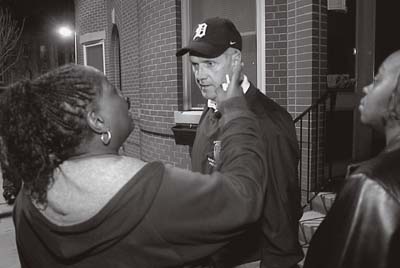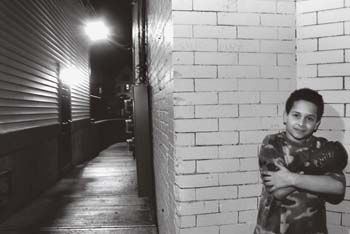 |
 |
| current issue |  |
past issues |  |
send a letter/news |  |
address update |  |
advertise |  |
about us |  |
alumni home |
Features
Street SmartPage 2 of 3
"I wanted them to think I was a little crazy," says Stewart. Just being a white guy out on the streets of Dorchester in those days was one indication of crazy. Being a wisecracker probation officer just added to the mystique. Once, while in Kansas on a speaking trip, Stewart detoured to visit Leavenworth Penitentiary just to say "Good morning" to an inmate he had helped put there. News of his visit was on Dorchester streets by the next morning.
 On a Dorchester street, Stewart listens to a resident.
On a Dorchester street, Stewart listens to a resident.
|
But to really be effective—to get kids to open up to him and trust him—Stewart needed to do more than make himself a legend on the street. "We have to see what that kid sees when he opens his eyes in the morning and what he sees at night," he explains. "We have to get into his world." That was part of Stewart's motivation for requesting that he and his partner, Skinner, be allowed to ride with police at night to check on their clients on the street and in their homes.
Initially, Stewart's idea was not an easy sell to police officers, who viewed probation officers more as caseworkers than as law enforcers. "Whenever you have a non-police person riding around in the car with you, you're apprehensive," says Robert Fretalia, the first police officer to agree to take Stewart along. It helped that Stewart had refereed Fretalia's high school football games. ("He needed glasses, but he was fair," says Fretalia.) Another factor was Stewart's discovery, during a summer vacation spent reading law books, that in some circumstances probation officers have greater enforcement powers than police officers. Without a warrant they can search people on probation, their homes or their cars, and can arrest them—all on reasonable suspicion.
Stewart and Skinner rode with Fretalia and his partner for the first time in November 1992. Within 15 minutes they were called to a shooting. The victim, who died, was one of Skinner's clients. In the crowd at the crime scene, Stewart recognized more than 30 kids in violation of their probation curfew. The kids in turn were shocked to see a probation officer after dark. But they talked to him, providing information that led to the arrest of the murderer.
The police dubbed the program Operation Nite Lite, and it became a key element to the Boston Strategy for Preventing Youth Violence. The guidelines for night visits to clients' homes were simple: The police were there as escorts for the probation officers, and everyone would be polite. But Stewart believes in being polite and honest. "I remember going to a house in 1994 and the mother said, 'I don't like white people coming to my house,'" Stewart recalls. "I told her I understood, but there were two reasons I was there. One was her son was on probation; if he weren't, I wouldn't have been there. The second reason was that I knew my son was safe and I wanted hers to be safe too."
"I told her, 'I'd prefer to see him at home with you than in jail. But I'd rather see him in jail than dead. When he went out, did he say, 'Good night, mom, I love you'? Well, tomorrow morning when he's in my office at 9 a.m. that's the first thing I'm going to work on. I'm going to make sure he says good night to his mom. OK? Have a nice night.'"

|
Stewart often goes into the bedroom of a curfew-violating client, makes his bed and leaves a lifesaver mint on the pillow with a note saying to come see him in the morning. He frequently rummages through the client's drawers or looks under the bed. Once, using as reasonable suspicion a display of gang colors on the wall, he searched a client's bedroom and found $5,000 in cash, 250 rocks of crack and an AK-47 assault rifle. The young man got seven to nine years.
But he's just as likely to chat with a client's grandmother or teach a teenage father how to burp his baby. And he doesn't believe his job ends when a kid is no longer on probation. One teen had gone through five probation officers by the time Stewart met him. With Stewart's encouragement he graduated from high school. He wanted to join the Army but was rejected because of his juvenile offenses. Stewart intervened. "Last I heard from him," Stewart says, "he sent me a picture of himself on duty in Germany."
A SILVER BULLET
While the police quickly became fans of Nite Lite, it was not widely accepted by other probation officers. Some accused Stewart of hounding his clients as well as risking his life. "We'll come to your funeral," they'd tell Stewart, who has been chased by a pit bull and threatened by a knife-wielding man who insisted Jehovah wanted him to kill a white man. He frequently wears a bulletproof vest for the night rides.
In 1997, however, President Clinton and Attorney General Janet Reno visited Boston and praised the program. In addition, Nite Lite received awards and extensive media coverage, including a 2000 cover story in Newsweek called "16 Silver Bullets: Smart Ideas to Fix the World." The program was also featured in The New York Times and on ABC Nightly News and PBS.
Nite Lite was institutionalized in 1998 and written into the contracts of all Massachusetts probation officers, who are now expected to spend 20 percent of their time in the community with police officers during nontraditional hours, before 8:30 a.m. or after 4:30 p.m.
Besides Nite Lite, Stewart became increasingly involved in other efforts to stymie youth violence. In April 1996, for instance, after two gang-related homicides, he suggested a forum to try to stop the expected spiral of retaliatory shootings. Working together, probation and police officers brought into one room all the members of both gangs and told them, according to Stewart, "Cut the violence. We're tired of the violence. Put your guns down. If not, three things are going to happen: You will be trailed, you will be nailed and you will be jailed."
Stewart helped carry out that threat. "We had undercover drug buys, strict enforcement of terms of probation, enforcement of jaywalking laws, enforcement of the 'breathing-without-a-brain' law, whatever we needed. I told them, 'I'm going to go into your bedroom and I'm going to flip your mattress and the sheets better be clean. I'm going to check your fingers, I'm going to urine-test you." Within six weeks, 23 gang members were arrested. The idea, Stewart says, was to "disrupt the criminal structure of the gang to lessen community fear and improve life in the targeted area." And, he says, it worked.
FUN WITH FELONS
Stewart takes MASH's Hawkeye as his role model and says that humor has saved his mental health. He calls it "fun with felons." He will say to a kid in a holding cell, "Don't go away—I'll be right back." Once, while he was watching a street where crack was being dealt, he saw a blond teenager driving a beat-up BMW slowly down the block. "I ran the plate and found out the kid was from the Cape," he says. "So I phoned and said, 'Mrs. so-and-so? This is the Lyon Street Crime Watch in Dorchester and I'm calling just to let you know your BMW with a blond male was on Lyon Street today, apparently for a drug transaction. We have enough problems up here with the kids who live here—we don't need anyone from Falmouth!'"
Page: < Prev 1 2 3 Next >Easy to print version

